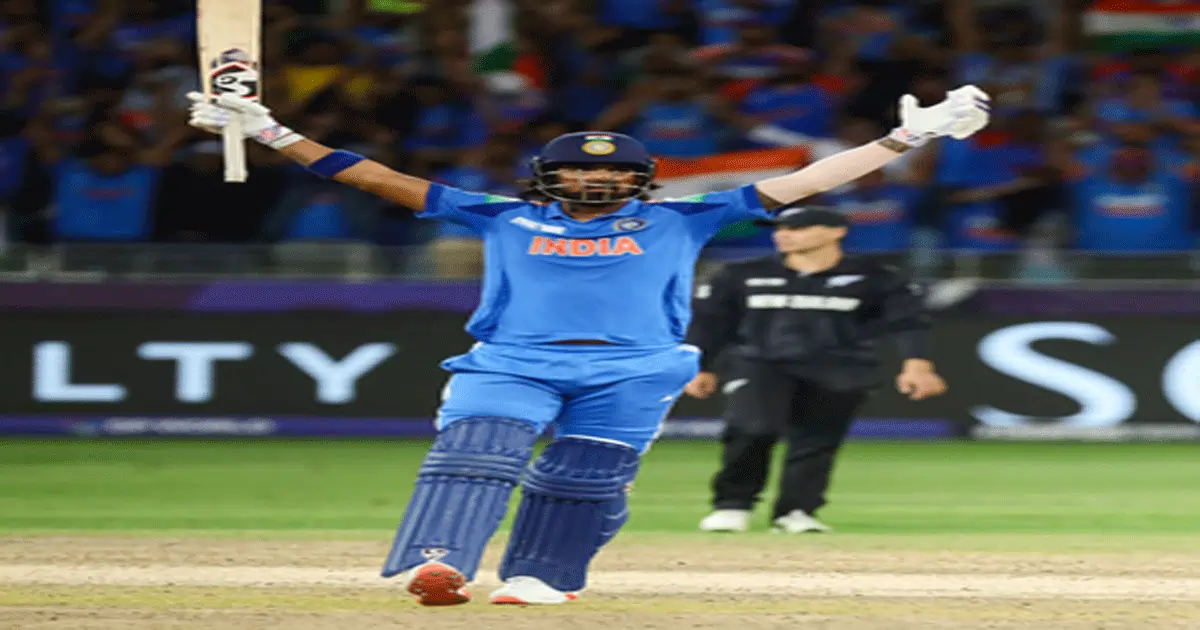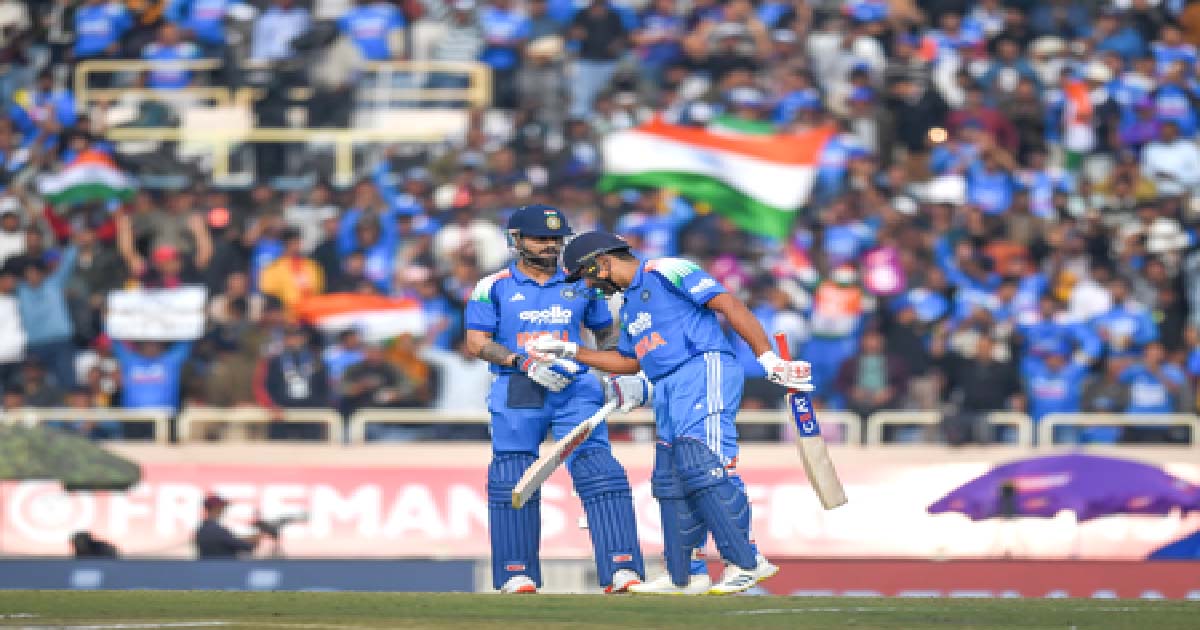Sports
Calm KL Rahul excels in adaptability as finisher, gets desired success in Champions Trophy

New Delhi, March 12: Oscillatory motion is characterised by the repetitive back-and-forth movement of an object about a fixed point, as exemplified by a clock pendulum. In a competition to find the most oscillatory player in the Indian team, KL Rahul would end up as the unanimous choice.
Rahul’s masterful cover drives and effortless flicks off his wrists, when at his best, are simply poetry in motion. But it isn’t easy being Rahul – the ups and downs in his batting positions have been challenging, similar to a pendulum’s back-and-forth movement.
Rahul’s success in finishing matches for India during their 2025 Champions Trophy triumph exemplifies this. Rahul faced a new ODI challenge when he was moved to the sixth spot, the finisher’s position after Axar Patel took his usual number five slot. Add to it, in the ODI series against England, there were always questions over why Rahul was preferred ahead of Rishabh Pant.
Rahul’s success in that role for India in the Champions Trophy was marked by his calm, humble, and proactive adaptability—qualities that have become second nature to him. While his 136 tournament runs may seem insignificant, they don’t tell the whole story of his vital role in India’s lower middle order.
“He didn’t complain whenever he was sent down the batting order. He used to ask me how I could be better and why should I play in that way. See, whenever he goes to bat at number six, or seven, it is hardly a few balls. He has always opened the batting, wherever he played.”
“So the change of the mindset and adapting to the situation, it is all new. He has played different roles, but this role was different and he started working for it. The planning and preparation was good, so that is how he could play well. He understood his role, and if you watched the final, when the left-arm spinners were bowling, he would easily take the singles between point, cover and extra cover.”
“His planning was good, and he planned it in a way that ‘Yes, I have to do that. I have to cross the line and win match for the country’. Except for that little bit of misunderstanding in running between the wickets with Axar, where he was a little hesitant, he otherwise played beautifully.”
“It was like a symphony – he was playing and that grace was there in running, and hitting the ball. So, it was very natural for him, and I will tell you, that patience and calmness is God’s gift for him,” said Samuel Jayaraj, KL Rahul’s childhood coach.
Similar to his renowned namesake from Bengaluru, who thrived in diverse roles in the ODI set-up, including wicketkeeping, Rahul has proven to be equally adaptable. “It is fantastic to see a player to go down anywhere and play. I think this name Rahul – they will fit in anywhere they play. The senior Rahul also did that for the country, and now this boy also is doing it.
“He enjoys doing it, not even one day there was no loose talk or any complaint – nothing. He said, ‘Sir, I enjoy it’. We never discussed on the points like where here is going to do the batting. He would also say, ‘I have to be ready. I am going to count the number of balls left and I have got a plan like this’,” added Jayaraj.
India’s Champions Trophy win over Bangladesh, Australia, and New Zealand coming via chases were significantly aided by Rahul’s adaptability and taking charge in a tricky situation. His vital scores of 41, 42 not out, and 34 not out on the slow Dubai wickets were worth its weight in gold in guiding India to success under pressure. Rahul’s success in those three chases, according to Jayaraj, stemmed from his smart strategic preparation.
“If you are playing against a left-arm spinner, you practice for facing that in a game. If you are playing against a leg-spinner, you prepare to play for that. These are all things that everybody does. In present day cricket, there is no wasting time. Every second is very, very important when you practice.
“See, he has matured, and for me, he is very intelligent too. He is always a very thoughtful cricketer. So, it became easy for him, and he had that willingness in him to perform, win and finish matches. Plus, a very important thing was in his mind – on how he could play better.
“Comparatively, I think Virat, Shubman Gill, and Rohit played very well, but they were playing in different matches. When it comes to Rahul, he didn’t bat against Pakistan, and in the rest of the matches, he got runs for us.
“Against Australia also, he had that patience of playing long and waiting for the loose ball. We all say we work very hard and all, but I think he has worked smarter and harder this time,” he elaborated.
Rahul’s cricketing career summary wouldn’t be complete without mentioning India’s loss to Australia in the 2023 ODI World Cup final in Ahmedabad. Rahul scored a 66 in the final, the slowest half-century for India in the tournament, and faced significant social media criticism as a result.
He later recounted in a YouTube chat with Ravichandran Ashwin about his uncertainty on the timing of taking down Mitchell Starc. But winning the Champions Trophy on March 9 could now comfort Rahul, a perspective Jayaraj supports.
“When we lost to Australia in the World Cup final, I think he took all the blame saying I should not have got out, that was a wrong timing, and I played a bad shot. That’s how an awakening call comes, and you get better from there. You start thinking, why it happened? How can I overcome it? So, all these thoughts were there.
“But he’s now got a trophy for the country, and it’s a very proud moment. When you lose a wicket in your match, then you start thinking, yes, I have to be a better player, my batting has to improve and I have to play more balls, as well as take the soft-handed singles, which he did in the final. It’s more about how well he built his innings, and even against Australia, he didn’t panic as there was so much of calmness,” he added.
Jayaraj also praised captain Rohit Sharma and the team management for supporting Rahul’s success in a new position. “The planning of the coaches was beautiful – they set the things correctly. If you ask me, I will give all my hats off to the coaches who have planned that.
“They wanted somebody to hold the innings there, and they believed in KL. They didn’t change when they could have sent KL up and would have asked Axar to come there. They didn’t do that as they believed in their set plan to go with that batting order.
“There was a lot of talking and understanding between the senior players and coaches. It gives you a lot of confidence as the team, captain, coach, management and selectors believe yes he will do it, and it was on purpose. I feel very proud now because he is doing lower middle order now,” he said.
Although the cricketing world is currently captivated by Rahul’s adaptable and cool-headed batting style in the Champions Trophy triumph, Jayaraj observed the tournament showcased the real Rahul – evoking memories of the time he saw him as a calm, disciplined, and obedient boy who was enthusiastic about batting.
“Everybody told me that against Australia, he played a fantastic game and I said, yes. I had gone out with my family for lunch on Sunday afternoon when somebody came and said, ‘Rahul has to play’. I said, ‘he has to perform’. I mean, it is his job, and if you start enjoying your job, and if you are happy there, you will perform.
“Whenever he batted in this Champions Trophy, I saw the real Rahul – when he was in his younger days – that focus, and batting grace. I have seen a lot of matches of his younger days, and really enjoyed seeing it. Even against Australia, he played very well. It was more of a mature innings in the final.”
“For me, he is always blessed, a good cricketer, and a good human being who enjoys his cricket. His humbleness and calmness are two of his great things, and I keep on telling him that. I could make out from his face that he enjoyed playing to his role, and that he was very, very happy in that phase, right from planning to preparation. He deserves all of this for the hard work and 10 years of good cricket he has played at the highest level,” he signed off.
National News
Lionel Messi’s G.O.A.T India Tour: Football Legend To Arrive On December 14 In Mumbai; CM Devendra Fadnavis Shares Excitement On X

Mumbai: is bracing for an unforgettable sporting spectacle as Lionel Messi, global football icon and seven-time Ballon d’Or winner, prepares to land in the city for the G.O.A.T India Tour 2025. Maharashtra Chief Minister Devendra Fadnavis shared the excitement on X, posting: “Counting down to 14th December! Looking forward to welcoming Lionel Messi to Mumbai… Our young players are eagerly preparing for this inspiring opportunity.”
Messi’s visit marks his first trip to India since 2011, when he captained Argentina in a friendly against Venezuela in Kolkata. This time, the legend arrives not for a match but for a grand-scale fan experience tailored exclusively for Mumbai. The anticipation has set the city buzzing, with fans gearing up for a night that promises to rewrite sporting memories.
The Mumbai chapter of the tour, scheduled for 14 December 2025, will take place at the iconic Wankhede Stadium, known for historic cricketing moments including India’s 2011 World Cup win and Sachin Tendulkar’s farewell. The venue will now welcome another sporting great, with organisers expecting over 30,000 fans to fill the stands.
The event will begin at 5 pm IST and is expected to go late into the night, blending football, music, choreography, and Mumbai’s trademark glamour. The Wankhede will transform into a pulsating arena with lights, performances and immersive audiovisual experiences designed to celebrate Messi’s extraordinary legacy.
Mumbai’s young footballers, academies, and fan clubs are preparing special tributes and gatherings ahead of the event. The G.O.A.T Tour also includes stops in Kolkata, Ahmedabad and New Delhi, but the Mumbai show is tipped to be the most spectacular. Hotels near Marine Drive and South Mumbai are already reporting heightened bookings as fans from across India converge for the once-in-a-lifetime experience.
National News
Privilege to have that kind of confidence from management: Gaikwad on batting at No. 4

Raipur, Dec 4: India batter Ruturaj Gaikwad, who scored his maiden ODI century in the second match against South Africa, said he felt “quite confident” about adapting to the No. 4 position, which he had never played in the 50-over format, adding that he felt privileged to receive such trust from the team management despite being a regular opener.
Gaikwad, who had batted 86 times in List A cricket but never below No. 3, started the series with 8 off 14 balls in Ranchi before scoring 105 off 83 balls at the Shaheed Veer Narayan Singh International Stadium.
His innings, which he said was his best across formats and levels, was laced with 12 fours and two sixes, at a strike-rate of 126.51. He reached his fifty off 52 balls, before accelerating in superb fashion to get his first ODI century in just 77 deliveries.
“The team management told me that I would be batting at No. 4 this series. I feel it’s a privilege to have that kind of confidence from the management towards an opener. So I took it that way,” Gaikwad said at the post-match presser.
“In the one-day format, even when I was opening the innings, I always tried to make sure that whenever I was set, I was able to bat till the 45th over and capitalise after that. So I knew somewhat how to play between overs 11 to 40, how to rotate strike, what the boundary options were. So I was pretty much confident about how I could go through the innings.
“It was just a matter of how I could play my first 10-15 balls, and after that, the process remains the same. I have been working really hard, and obviously been in good touch as well. So I wanted to make sure that whenever I am set, I make it a big one,” he added.
Gaikwad also stitched a huge 195-run third-wicket stand with batting stalwart Virat Kohli, who scored his second hundred in as many games and overall his 53rd ODI ton.
Asked about his partnership with Kohli, Gaikwad said it was a moment he dreamed of. “I have been able to witness him since last one week now,” he said. “Whatever practice sessions we have had, he is batting unbelievably well… the amount of time he has and how he is able to convert it in the match as well. And even this game, I enjoyed a lot. Mostly, I was trying to be in my zone and not really think about how he is batting or how he is able to score runs,” he said.
Gaikwad continued, “The chat in between was very clear. We had set 5-5, 10-10-run target and discussed how to manoeuvre the gaps or how to hit those boundaries, how we can rotate strike.
“So the chat was around that. I think we had really good running between the wickets as well. Obviously, you dream of these kinds of moments and to be able to have that kind of partnership, I really enjoyed a lot.”
But Kohli and Gaikwad’s centuries went in vain as a clinical and collective effort from South Africa guided the visitors to a series-levelling four-wicket win in the second in Raipur.
National News
Virat Kohli and Rohit Sharma show will continue: Dale Steyn

New Delhi, Dec 2: Former South Africa cricketer Dale Steyn believes Virat Kohli and Rohit Sharma’s show will continue in the ongoing ODI series ahead of the second ODI on Wednesday in Raipur.
At the JSCA International Stadium Complex in Ranchi, India overcame a scare and easily defeated South Africa in a closely contested match to win the first ODI by 17 runs and take a 1-0 lead in the three-match series.
Speaking on the expectations from the second ODI, JioStar expert Dale Steyn said: “I think the Virat Kohli and Rohit Sharma show will continue. I’m eager to see which fast bowlers, and which spinners, come out and do something interesting.”
India put up a commanding first innings total, driven by a brilliant century from Virat Kohli and critical fifties from Rohit Sharma and K.L. Rahul following the early setback as India amassed a mammoth 398/8 in 50 overs. Later in the game, Kuldeep Yadav 4/68 and Harshit Rana 3/65 helped India beat the visitors by 17 runs.
The experienced pair of Rohit and Virat stitched together a fluent 136-run stand, taking the pressure off after the early setback. Rohit reached a brisk 57 off 51 balls and broke Shahid Afridi’s long-standing record for most ODI sixes before Marco Jansen trapped him lbw.
In the meantime, Kohli carried on unhindered, reaching his 83rd international century and 52nd ODI century. He advanced fast after reaching three figures, taking on Prenelan Subrayen with two fours and two sixes.
Rahul offered excellent support with a well-paced 60, adding 76 important runs with Kohli. After Kohli’s removal for 135, Rahul and Ravindra Jadeja pushed India towards a huge finish with a 65-run partnership. But a late mini-collapse that included wickets from Corbin Bosch and Jansen limited India to 349/8.
Steyn emphasised the importance of wicket-keeper batter Quinton de Kock’s role and expects a big knock from him. “It’s been a batter’s paradise so far, so which bowlers will step up and really perform in the second ODI? Quinton de Kock didn’t score any runs in the first ODI, but I feel like he has a point to prove. He’s someone South Africa will lean on to score big for them.”
-

 Crime3 years ago
Crime3 years agoClass 10 student jumps to death in Jaipur
-

 Maharashtra1 year ago
Maharashtra1 year agoMumbai Local Train Update: Central Railway’s New Timetable Comes Into Effect; Check Full List Of Revised Timings & Stations
-

 Maharashtra1 year ago
Maharashtra1 year agoMumbai To Go Toll-Free Tonight! Maharashtra Govt Announces Complete Toll Waiver For Light Motor Vehicles At All 5 Entry Points Of City
-

 Maharashtra1 year ago
Maharashtra1 year agoFalse photo of Imtiaz Jaleel’s rally, exposing the fooling conspiracy
-

 National News1 year ago
National News1 year agoMinistry of Railways rolls out Special Drive 4.0 with focus on digitisation, cleanliness, inclusiveness and grievance redressal
-

 Maharashtra1 year ago
Maharashtra1 year agoMaharashtra Elections 2024: Mumbai Metro & BEST Services Extended Till Midnight On Voting Day
-

 National News1 year ago
National News1 year agoJ&K: 4 Jawans Killed, 28 Injured After Bus Carrying BSF Personnel For Poll Duty Falls Into Gorge In Budgam; Terrifying Visuals Surface
-

 Crime1 year ago
Crime1 year agoBaba Siddique Murder: Mumbai Police Unable To Get Lawrence Bishnoi Custody Due To Home Ministry Order, Says Report












